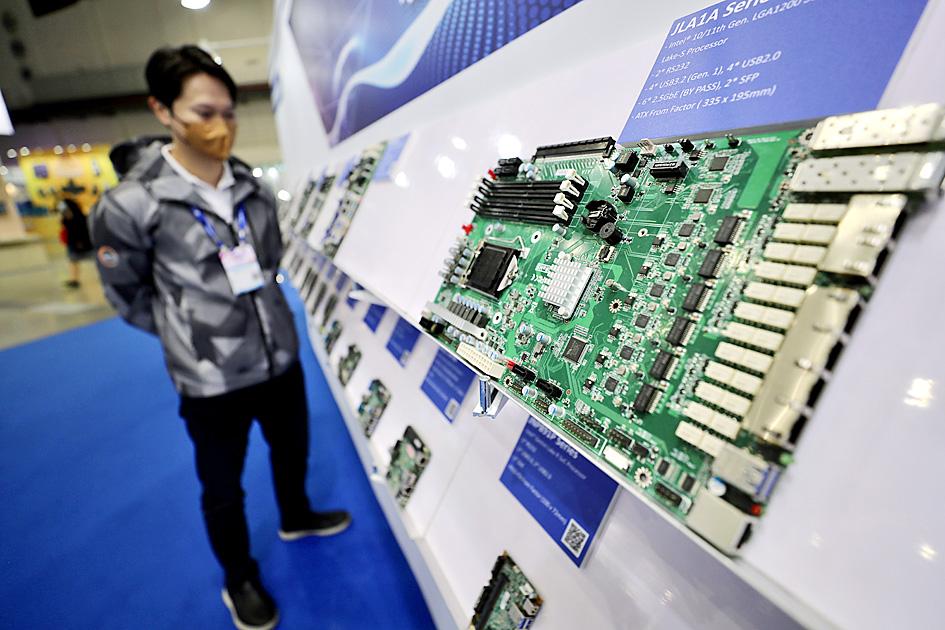Taiwan’s market share in advanced industries relative to its size is more than double the world average, driven almost solely by its dominance in computers and electronics, a report issued on Wednesday by a Washington-based research institute showed.
The report by the Information Technology and Innovation Foundation measured the performance of 10 leading economies across seven key sectors in the years 1995, 2006 and 2018.
The sectors included pharmaceuticals; medicinal, chemical and botanical products; electrical equipment; machinery and equipment; motor vehicle equipment; other transport equipment; computer, electronic and optical products; and information technology and information services.

Photo: Ritchie B. Tongo, EPA-EFE
It found that in 2018, Taiwan’s market share in the industries relative to its size was 219 percent higher than the global average, followed by South Korea at 206 percent.
By contrast, Germany’s relative share of the global market in those sectors was 74 percent higher than the global average, Japan’s was 43 percent higher and China’s 34 percent higher, while the US finished below the global average.
In terms of performance, the report said that Taiwan’s global share of advanced industrial production sectors had declined slightly over the past 25 years, slipping in six of the seven industry categories.
However, in one industry category — computers, electronics and optics — Taiwan’s global share grew by 1.3 percentage points, largely due to the performance of companies such as Taiwan Semiconductor Manufacturing Co (台積電) and Hon Hai Precision Industry Co (鴻海精密).
Overall, Taiwan’s advanced industrial output was “the least diversified” of the countries in the study, with almost nine times more computer and electronics production as a share of its economy than the global average, the report said.
“Because of this, advanced industries make up more than twice the share of its economy as the global average,” despite Taiwan’s weakness in industries such as pharmaceuticals and automobiles, it said.
More broadly, the report aimed to highlight the US’ relatively weak position in a range of advanced industries that are strategically important for economic and national security.
Compared with China, whose share of global output in the industries grew from less than 4 percent in 1995 to 21.5 percent in 2018, the US’ market share fell from 24 percent to 22.5 percent, the report said.
Calling the findings “an urgent wake-up call,” it urged the US government to launch an economic “moon shot” initiative aimed at increasing its relative level of advanced industry concentration by 20 percentage points over the next decade.

Sweeping policy changes under US Secretary of Health and Human Services Robert F. Kennedy Jr are having a chilling effect on vaccine makers as anti-vaccine rhetoric has turned into concrete changes in inoculation schedules and recommendations, investors and executives said. The administration of US President Donald Trump has in the past year upended vaccine recommendations, with the country last month ending its longstanding guidance that all children receive inoculations against flu, hepatitis A and other diseases. The unprecedented changes have led to diminished vaccine usage, hurt the investment case for some biotechs, and created a drag that would likely dent revenues and

Global semiconductor stocks advanced yesterday, as comments by Nvidia Corp chief executive officer Jensen Huang (黃仁勳) at Davos, Switzerland, helped reinforce investor enthusiasm for artificial intelligence (AI). Samsung Electronics Co gained as much as 5 percent to an all-time high, helping drive South Korea’s benchmark KOSPI above 5,000 for the first time. That came after the Philadelphia Semiconductor Index rose more than 3 percent to a fresh record on Wednesday, with a boost from Nvidia. The gains came amid broad risk-on trade after US President Donald Trump withdrew his threat of tariffs on some European nations over backing for Greenland. Huang further

CULPRITS: Factors that affected the slip included falling global crude oil prices, wait-and-see consumer attitudes due to US tariffs and a different Lunar New Year holiday schedule Taiwan’s retail sales ended a nine-year growth streak last year, slipping 0.2 percent from a year earlier as uncertainty over US tariff policies affected demand for durable goods, data released on Friday by the Ministry of Economic Affairs showed. Last year’s retail sales totaled NT$4.84 trillion (US$153.27 billion), down about NT$9.5 billion, or 0.2 percent, from 2024. Despite the decline, the figure was still the second-highest annual sales total on record. Ministry statistics department deputy head Chen Yu-fang (陳玉芳) said sales of cars, motorcycles and related products, which accounted for 17.4 percent of total retail rales last year, fell NT$68.1 billion, or

Macronix International Co (旺宏), the world’s biggest NOR flash memory supplier, yesterday said it would spend NT$22 billion (US$699.1 million) on capacity expansion this year to increase its production of mid-to-low-density memory chips as the world’s major memorychip suppliers are phasing out the market. The company said its planned capital expenditures are about 11 times higher than the NT$1.8 billion it spent on new facilities and equipment last year. A majority of this year’s outlay would be allocated to step up capacity of multi-level cell (MLC) NAND flash memory chips, which are used in embedded multimedia cards (eMMC), a managed